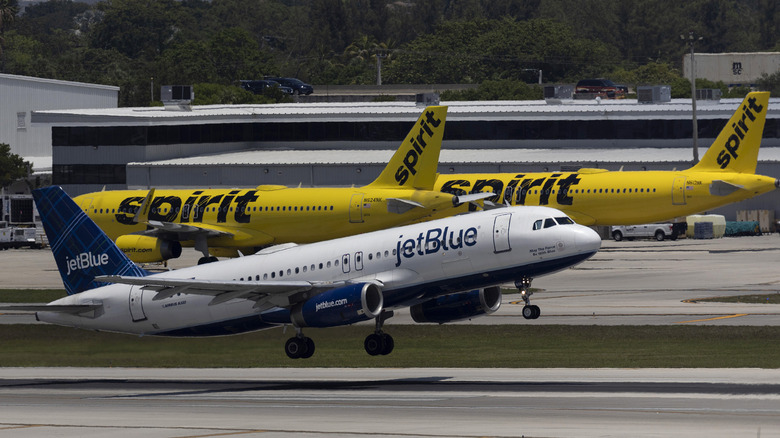
After failed mergers with JetBlue and Frontier led Spirit Airlines to file for bankruptcy last November, it was clear that Spirit Airlines wasn't standing on stable ground financially. The airline seemingly isn't out of the woods yet, as Spirit stated in a quarterly Securities and Exchange Commission filing on Monday that the company might cease operations within the next 12 months. The demise of the low-cost carrier could have detrimental effects for airline passengers, whether or not they have ever flown on a canary yellow plane.
In the report for the second quarter, Spirit listed a $245.8 million loss, citing adverse market conditions, such as low demand for leisure travel. The report would later state that "management has concluded there is substantial doubt as to the Company's ability to continue as a going concern within 12 months from the date these financial statements are issued." However, the low-cost carrier does see a light at the end of the tunnel. Spirit CEO Dave Davis tried to reassure the airline's employees in an internal email obtained by Newsweek. The CEO mentioned the worrying statement was "required by our outside auditors to convey that there is risk if we do not make changes. But, we are."
 Joe Raedle/Getty Images
Joe Raedle/Getty Images
While very few people are vocal fans of Spirit Airlines, it's impossible to ignore the downward pressure the carrier puts on ticket prices across all airlines operating in the United States. Ahead of a court-rejected $3.8 billion acquisition of Spirit, JetBlue's own internal analysis found that ticket prices would rise by 30% on routes where it would no longer be competing against Spirit. Based on this evidence, a Justice Department attorney found that Spirit's absence would cost passengers $1 billion per year.
Spirit circling the drain is a symptom of a larger commercial aviation trend where extracting every dollar out of customers is becoming increasingly common. Southwest controversially departed the ranks of the low-cost airlines in the hopes of becoming a mainline carrier and raking in the profits that come along with that status. The Dallas-based airline dropped its beloved "bags fly free" policy, introduced assigned seating and added premium seats. If airlines have no reason to compete on price, they will try to increase profitability as much as possible.
















